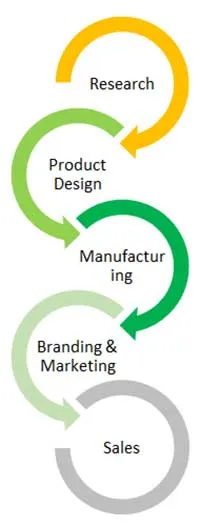Designing ‘thoughtful products’ for profits
Building a product creates an enormous amount of value. It’s true value creation – the process of designing and building something from scratch – and more often than not leads to some of the most enduring companies anywhere. Think Hewlett-Packard, Apple, Ford, Toyota, Xiaomi: all of them are enormously valuable, build things that people will pay good money to buy, and create entire industries around themselves.

You cannot create a truly great economy without such companies. A lot of companies will become valuable over time, and will also solve a lot of problems for its users, but a great economy will almost inevitably have great product companies at its core. Germany, the US, Japan – none of them was a world leader in business process outsourcing.
A broad spectrum

Manufacturing is actually an interim step. There’s research and product design before that and branding, marketing and sales after that. Smart entrepreneurs have created enormous value for themselves at every step of this chain.
Several niche companies excel in research, technology development, and are licensing design out to others.
Several product design studios like IDEO Product Design exists to serve customer-facing companies with sensible and intuitive products often using the technology from other companies.
Companies like Foxconn have completely changed the manufacturing paradigm by becoming the contract manufacturers for the world.
Some companies will remain hands-off and only work on branding and marketing the product made by organisations like Foxconn, while the entire e-commerce world has mastered the sales and distribution cycle of products.
Value addition
There is tremendous value creation at every step and manufacturing obviously has a huge chunk of it. But it may not have the biggest potential to capture value.
For example; Apple designs, brands, markets and sells its products. China (or more accurately Foxconn) does the heavy-lifting of getting the supply chain in order, manufacturing, and actually shipping the product. According to industry estimates, the value retained by Apple as a percentage of the final price is about 30-58 percent, whereas value retained by China and Foxconn as a percentage of the final price is approximately four percent. (Source)
Why is the value captured by one of the most important parts of the cycle so low? Because competition has driven it to that point. Foxconn is not the only electronics manufacturer out there and the field is completely open to rapid duplication. Contrast this with the work that Apple does. It’s not easy to duplicate Apple’s intellectual property or to build the ecosystem of apps and developers that it has cultivated over the years. Designing similar products requires a high-calibre team and does not lend itself very well to a commodity business mindset.
So, is manufacturing unimportant?
No. On the other hand, controlling your own manufacturing is the best way to keep your IP to yourself and to have better integration in the operations. However, the other steps are simply far more valuable to miss out on. Perhaps we don’t have a 3M equivalent in India today because focusing on long-term research needs a different sort of investment and mentality. As part of a fast-developing market, this approach is often lacking and this is perhaps okay. But we don’t have an Apple equivalent either. And that’s where we are running the risk of losing a lot of value.
If companies in India continue to licence out the technology from somewhere else, and just manufacture the designs (often conceptualised elsewhere), then, in the long term, we will remain a nation of traders. We need to have companies run by product people. People who can empathise with the end-customers and build solutions for them and not merely sell items. Otherwise, we will keep missing wave after wave of technology and will always be playing catch-up.
Customers are evolving and many are demanding more thoughtful products rather than just ‘value’ products. Designers are getting importance everywhere and thanks to the current startup boom, a lot of talent is staying back to (in the words of Peter Thiel) “build that valuable company that nobody else is building”.
Interesting times ahead for product companies in India.
(Disclaimer: The views and opinions expressed in this article are those of the author and do not necessarily reflect the views of YourStory.)







